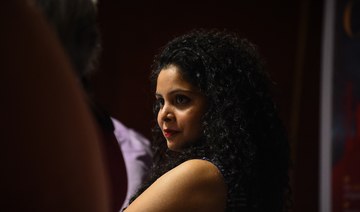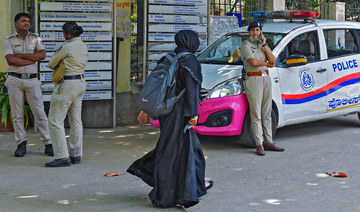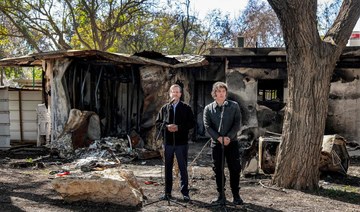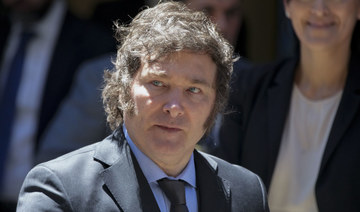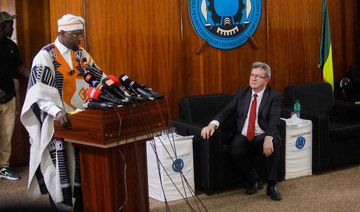NEW DELHI: A recent court ruling upholding a ban on Muslim students wearing head coverings in schools has sparked criticism from constitutional scholars and rights activists amid concerns of judicial overreach regarding religious freedoms in officially secular India.
Even though the ban is only imposed in the southern state of Karnataka, critics worry it could be used as a basis for wider curbs on Islamic expression in a country already witnessing a surge of Hindu nationalism under Prime Minister Narendra Modi’s governing Bharatiya Janata Party.
“With this judgment, the rule you are making can restrict the religious freedom of every religion,” said Faizan Mustafa, a scholar of freedom of religion and vice chancellor at the Hyderabad-based Nalsar University of Law. “Courts should not decide what is essential to any religion. By doing so, you are privileging certain practices over others.”
Supporters of the decision say it’s an affirmation of schools’ authority to determine dress codes and govern student conduct, and that takes precedence over any religious practice.
“Institutional discipline must prevail over individual choices. Otherwise, it will result in chaos,” said Karnataka Advocate General Prabhuling Navadgi, who argued the state’s case in court.
Before the verdict more than 700 signatories including senior lawyers and rights advocates had expressed opposition to the ban in an open letter to the court’s chief justice, saying, “the imposition of an absolute uniformity contrary to the autonomy, privacy and dignity of Muslim women is unconstitutional.”
The dispute began in January when a government-run school in the city of Udupi, in Karnataka, barred students wearing hijabs from entering classrooms. Staffers said the Muslim headscarves contravened the campus’ dress code, and that it had to be strictly enforced.
Muslims protested, and Hindus staged counterdemonstrations. Soon more schools imposed their own restrictions, prompting the Karnataka government to issue a statewide ban.
A group of female Muslim students sued on the grounds that their fundamental rights to education and religion were being violated.
But a three-judge panel, which included a female Muslim judge, ruled last month that the Qur’an does not establish the hijab as an essential Islamic practice and it may therefore be restricted in classrooms. The court also said the state government has the power to prescribe uniform guidelines for students as a “reasonable restriction on fundamental rights.”
“What is not religiously made obligatory therefore cannot be made a quintessential aspect of the religion through public agitations or by the passionate arguments in courts,” the panel wrote.
The verdict relied on what’s known as the essentiality test — basically, whether a religious practice is or is not obligatory under that faith. India’s constitution does not draw such a distinction, but courts have used it since the 1950s to resolve disputes over religion.
In 2016, the high court in the southern state of Kerala ruled that head coverings were a religious duty for Muslims and therefore essential to Islam under the test; two years later India’s Supreme Court again used the test to overturn historical restrictions on Hindu women of certain ages entering a temple in the same state, saying it was not an “essential religious practice.”
Critics say the essentiality test gives courts broad authority over theological matters where they have little expertise and where clergy would be more appropriate arbiters of faith.
India’s Supreme Court is itself in doubt about the test. In 2019 it set up a nine-judge panel to reevaluate it, calling its legitimacy regarding matters of faith “questionable”; the matter is still under consideration.
The lawsuit in Karnataka cited the 2016 Kerala ruling, but this time the justices came to the opposite conclusion — baffling some observers.
“That’s why judges make for not-so-great interpreters of religious texts,” said Anup Surendranath, a professor of constitutional law at the Delhi-based National Law University.
Surendranath said the most sensible avenue for the court would have been to apply a test of what Muslim women hold to be true from a faith perspective: “If wearing hijab is a genuinely held belief of Muslim girls, then why ... interfere with that belief at all?”
The ruling has been welcomed by Bharatiya Janata Party officials from Mukhtar Abbas Naqvi, the federal minister of minority affairs, to B. C. Nagesh, Karnataka’s education minister.
Satya Muley, a lawyer at the Bombay High Court, said it’s perfectly reasonable for the judiciary to place some limits on religious freedoms if they clash with dress codes, and the verdict will “help maintain order and uniformity in educational institutions.”
“It is a question of whether it is the constitution, or does religion take precedence?” Muley said. “And the court’s verdict has answered just that by upholding the state’s power to put restrictions on certain freedoms that are guaranteed under the constitution.”
Surendranath countered that the verdict was flawed because it failed to invoke the three “reasonable restrictions” under the constitution that let the state interfere with freedom of religion — for reasons of public order, morality or health.
“The court didn’t refer to these restrictions, even though none of them are justifiable to ban hijabs in schools,” Surendranath said. “Rather, it emphasized homogeneity in schools, which is opposite of diversity and multiculturalism that our constitution upholds.”
The Karnataka ruling has been appealed to India’s Supreme Court. Plaintiffs requested an expedited hearing on the grounds that a continued ban on the hijab threatens to cause Muslim students to lose an entire academic year. The court declined to hold an early hearing, however.
Muslims make up just 14 percent of India’s 1.4 billion people, but nonetheless constitute the world’s second-largest Muslim population for a nation. The hijab has historically not been prohibited or restricted in public spheres, and women donning the headscarf — like other outward expressions of faith, across religions — is common across the country.
The dispute has further deepened sectarian fault lines, and many Muslims worry hijab bans could embolden Hindu nationalists and pave the way for more restrictions targeting Islam.
“What if the ban goes national?” said Ayesha Hajjeera Almas, one of the women who challenged the ban in the Karnataka courts. “Millions of Muslim women will suffer.”
Mustafa agreed.
“Hijab for many girls is liberating. It is a kind of bargain girls make with conservative families as a way for them to go out and participate in public life,” he said. “The court completely ignored this perspective.”
Indian scholars, activists criticize school hijab ban ruling
https://arab.news/vkjs2
Indian scholars, activists criticize school hijab ban ruling
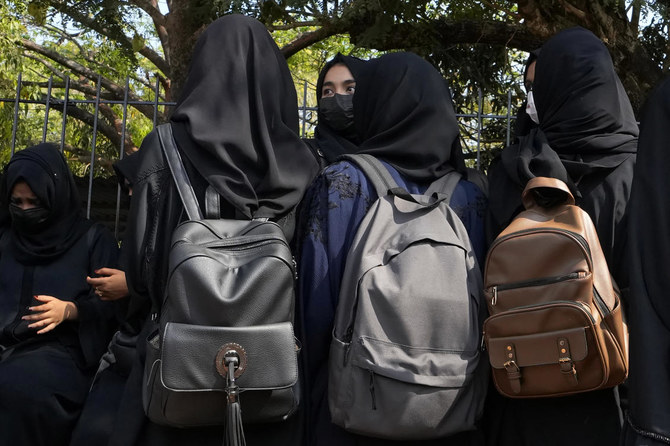
- Muslims protested, and Hindus staged counterdemonstrations
- Soon more schools imposed their own restrictions, prompting the Karnataka government to issue a statewide ban
Argentine president begins unusual visit to Spain, snubbing officials and courting the far-right

- The brash President Javier Milei has no plans to meet Spain's PM — nor any other government official
- He will instead attend a far-right summit Sunday hosted by Sánchez’s fiercest political opponent, the Vox party
BUENOS AIRES, Argentina: Even before kicking off a three-day visit to Madrid on Friday, Argentina’s libertarian President Javier Milei stirred controversy, accusing the socialist government of bringing “poverty and death” to Spain and weighing in on corruption allegations against the prime minister’s wife.
In such circumstances, a typical visiting head of state may strive to mend fences with diplomacy.
Not Milei. The brash economist has no plans to meet Spanish Prime Minister Pedro Sánchez during his three days in the Spanish capital — nor the Spanish king, nor any other government official. Instead, he’ll attend a far-right summit Sunday hosted by Sánchez’s fiercest political opponent, the Vox party.
The unorthodox visit was business as usual for Milei, a darling of the global far right who has bonded with tech billionaire Elon Musk and praised former US President Donald Trump. Earlier this year on a trip to the United States, Milei steered clear of the White House and took the stage at the Conservative Political Action Conference, or CPAC, where he railed against abortion and socialism and shared a bear hug with Trump.
Milei presented his 2022 book, “The Way of the Libertarian,” in Madrid Friday at a literary event organized by La Razón, a conservative Spanish newspaper.
The book — withdrawn from circulation in Spain earlier this month because the back-flap biography erroneously said Milei had earned a doctorate — traces his meteoric rise in politics from eccentric TV personality to national lawmaker and outlines his radical free-market economic ideas.
To thunderous applause, Milei condemned socialism as “an intellectual fraud and a horror in human terms.”
“The good thing is that the spotlight is shining on us everywhere and we are making the reds (leftists) uncomfortable all over the world,” Milei said.
He took the opportunity to promote the results of his harsh austerity campaign in Argentina, celebrating a decline in monthly inflation in April though making no mention of the Buenos Aires subway fares that more than tripled overnight.
Repeating a campaign pledge to eliminate Argentina’s central bank — without giving further details — Milei promised to make Argentina “the country with the most economic freedom in the world.”
At the event Milei gave a huge hug to his ideological ally Santiago Abascal, the leader of the hard-right Vox party and the only politician with whom Milei has actual plans to meet in Madrid.
The Vox summit Sunday seeks to bring together far-right figures from across Europe in a bid to rally the party’s base ahead of European parliamentary elections in June. Milei described his attendance a “moral imperative.” He also has plans to meet Spanish business executives Saturday.
Tensions between Milei and Sánchez have simmered since the moment the Spanish prime minister declined to congratulate the libertarian economist on his shock election victory last November.
But hostility exploded earlier this month when one of Sánchez’s ministers suggested Milei had taken narcotics. The Argentine presidency responded with an unusually harsh official statement accusing Sánchez’s government of “endangering the middle class with its socialist policies that bring nothing but poverty and death.”
The lengthy government statement also accused Sánchez of having “more important problems to deal with, such as the corruption accusations against his wife.”
The allegations of influence peddling and corruption brought by a right-wing group against Sánchez’s wife, Begoña Gómez, had prompted Sánchez, one of Europe’s longest serving Socialist leaders, to consider stepping down.
Senegal’s new president welcomes challenge to help reconcile ECOWAS with Mali, Burkina Faso, and Niger

- Ghana’s President Akufo-Addo sought Bassirou Diomaye Faye's help during their meeting in Accra on Friday
- Faye said that he hoped to convince the countries to “come back and share our common democratic values and what we stand for”
ACCRA: Ghana’s president Friday urged his visiting Senegalese counterpart to use his goodwill within the Economic Community of West African States to help resolve disputes with Niger, Burkina Faso and Mali.
President Bassirou Diomaye Faye arrived in the capital Accra early in the morning after visiting Nigeria’s President Bola Ahmed Tinubu.
Niger, Mali and Burkina Faso in January 2024 announced they were leaving ECOWAS after they were suspended by the group over military coups in all three nations.
“We are lucky to have a new leader in place because I think he is also going to help us to try and resolve the big problem that we have in the ECOWAS community,” Ghana’s President Nana Akufo-Addo said after meeting Faye.
“President Faye is very committed to seeing what he and the rest of us can do to reach out and revive the dialogue.”
Speaking to reporters after bilateral talks, Akufo-Addo said Faye had demonstrated commitment to ECOWAS efforts to bring the three countries to the table for further talks and back to the bloc.
Faye, 44, won a resounding victory as an anti-establishment candidate promising major reforms to become Senegal’s youngest-ever president.
His election has been seen as an inspiration for change in contrast to some of the continent’s aging leaders who have been in power for years and to other countries now run by military governments.
He welcomed the challenge to help reconcile ECOWAS with Mali, Burkina Faso, and Niger.
ECOWAS “is going through difficult times but we are going to do all we can to consolidate the gains made in integration, in a spirit of common, fraternal solidarity,” Faye told reporters.
Unity was “primordial” in the region, he added.
Earlier in Nigeria, Faye said that alongside Nigeria, which currently chairs ECOWAS, he hoped to convince the countries to “come back and share our common democratic values and what we stand for.”
Nancy Pelosi’s husband’s attacker jailed for 30 years

SAN FRANCISCO: A man who attacked the elderly husband of former US House Speaker Nancy Pelosi with a hammer was sentenced Friday to 30 years in prison.
David DePape was convicted last year of breaking into the couple’s San Francisco home and bludgeoning Paul Pelosi in a horrifying attack captured on police bodycam.
At the time of the October 2022 assault, Democrat Nancy Pelosi was second in line to the presidency and a regular target of outlandish far-right conspiracy theories.
Jurors in his trial last year heard how DePape — a Canadian former nudist activist who supported himself with occasional carpentry work — had initially planned to target Nancy Pelosi, planning to smash her kneecaps if she did not admit to her party’s “lies.”
On arriving at their home armed with rope, gloves and duct tape, DePape instead encountered her then-82-year-old husband, and kept asking, “Where’s Nancy?“
During what DePape told officers was a “pretty amicable” conversation with Paul Pelosi, the husband managed to call for help from law enforcement officers.
Moments later when police arrived DePape hit Pelosi with a hammer before officers rushed at him and took the weapon away.
Pelosi was knocked unconscious and had his skull fractured. He spent almost a week in a hospital, where he underwent surgery.
Nancy Pelosi was not at home the night of the attack.
Prosecutors had asked the federal court in San Francisco to sentence DePape to 40 years in prison.
In the lead up to Friday’s sentencing, Nancy Pelosi had asked the judge to impose a “very long” sentence for an attack that “has had a devastating effect on three generations of our family.”
“Even now, eighteen months after the home invasion and assault, the signs of blood and break-in are impossible to avoid.
“Our home remains a heartbreaking crime scene,” she wrote, according to court documents cited by the San Francisco Chronicle.
On Friday her office said the family was proud of Paul Pelosi “and his tremendous courage in saving his own life on the night of the attack and in testifying in this case.”
DePape had pleaded not guilty to charges that included assault on a family member of a US official, and attempted kidnapping of a US official.
While not denying the attack, his defense rested on contesting federal prosecutors’ claims that he had targeted Nancy Pelosi in her official capacity.
Instead, his lawyers argued that DePape was driven to target a number of prominent liberal figures, due to his exposure to a web of obscure conspiracy theories.
In social media posts, DePape shared QAnon theories and false claims that the last US election was stolen.
The trial heard how DePape did not intend to stop his supposed anti-corruption crusade with Pelosi, and had drawn up a list of other targets including a feminist academic whom he accused of turning US schools into “pedophile molestation factories.”
Other personalities the defendant admitted wanting to attack included California Governor Gavin Newsom, President Joe Biden’s son Hunter, and actor Tom Hanks.
Jurors took less than 10 hours to reject DePape’s explanation of the attack, which took place just a few days before the US midterm elections.
The attack itself became politicized in the weeks after it occurred, with some members of the Republican Party mocking the incident and suggesting lurid and unsubstantiated explanations for why there was a man in Pelosi’s house late at night.
US Attorney General Merrick Garland said Friday that DePape’s sentence should serve as a warning that attacks on political figures and their families were unacceptable.
“In a democracy, people vote, argue, and debate to achieve the policy outcome they desire,” he said.
“But the promise of democracy is that people will not employ violence to affect that outcome.
“The Justice Department will aggressively prosecute those who target public servants and their families with violence.”
Burkina loyalists rally after gunfire near presidency

- Burkina Faso news agency AIB reported that an individual had tried to attack a guard at the palace but there were no injuries or damage
- Junta leader Traore seized power in a coup on September 30, 2022, deposing a military regime that earlier ousted the elected president Roch Marc Christian Kabore
OUAGADOUGOU, Burkina Faso: Hundreds of demonstrators rallied in Burkina Faso’s capital Friday in support of the country’s military rulers after gunfire was reported near the presidency, AFP reporters said.
Demonstrators gathered at a roundabout in central Ouagadougou, vowing to protect the rule of President Ibrahim Traore.
Earlier in the afternoon, “there were shots fired near the presidential palace,” said one demonstrator, Moussa Sawadogo.
“We do not know what is going on but we are there to stop anything from happening.”
Burkina Faso news agency AIB reported that an individual had tried to attack a guard at the palace but there were no injuries or damage.
Security forces closed off access to the area around the palace, AFP reporters saw.
The landlocked West African nation has been run by a military regime since mutinying soldiers deposed elected president Roch Marc Christian Kabore in 2022.
Junta leader Traore then seized power in another coup on September 30, 2022.
He established a transitional government and legislative assembly for 21 months, a period set to expire on July 1.
National consultations on the next steps in the transition to civilian rule are scheduled for May 25 to 26.
Since 2015, Burkina’s forces have been struggling to combat jihadist insurgencies that have killed thousands of people and forced around two million from their homes — violence that the army’s leaders used to justify their coups.
Zelensky rejects Olympic truce call, saying it could help Russia

- Zelensky said he had spoken to French President Emmanuel Macron who made the appeal told him Russian President Putin cannot be trusted
- Putin earlier on Friday also suggested that Moscow would not support the idea of a truce during the games in Paris this summer
KYIV: Ukrainian President Volodymyr Zelensky in an interview with AFP on Friday rejected a French call for an Olympic truce this summer, saying it could just help Russia move its troops and equipment.
In an interview with AFP on Friday, Zelensky said he had spoken to French President Emmanuel Macron who made the appeal and told him: “Let’s be honest... Emmanuel, I don’t believe it.”
“Who can guarantee that Russia will not use this time to bring its forces to our territory?” Zelensky said, adding: “First of all, we don’t trust Putin.”
“We are against any truce that plays into the hands of the enemy,” he said.
“If it’s a truce, an Olympic truce for the duration of the Olympics, a land truce, they will have an advantage,” he said, explaining that there was “a risk that they will bring heavy equipment to our territory and no one will be able to stop them.”
Russian President Vladimir Putin earlier on Friday also suggested that Moscow would not support the idea of a truce during the games in Paris this summer.
Asked during a visit to China whether he backed Macron’s idea, Putin said: “I think these Olympic principles, including the ‘Olympic truce’ are very right.”
But he added: “Today’s international sporting officials are themselves disobeying the principles of the Olympic charter.”
He accused sports bodies of “not allowing our athletes to perform at the games with our banner, flag and our national music, our anthem.”
“They are committing violations against us and demand fulfilment from us. Dear friends: we won’t get far that way. No one has ever come to an agreement that way,” Putin said.
Macron had restated on Friday his idea of “an Olympic truce so that Russia ceases its current operations” in Ukraine.
Macron also thanked Chinese President Xi Jinping last week for backing the idea of a truce in all conflicts, including Ukraine, during the Paris Olympics.
Only 25 percent of needed air defense
Zelensky also said his country needed over a hundred aircraft to counter Russian air power and said Ukraine only had a quarter of the air defenses it needs.
His country has faced a surge of devastating attacks as the war stretches into its third year, leading Kyiv to double down on pleas to strengthen its depleted air defenses.
“Today we have about 25 percent of what we need to defend Ukraine. I’m talking about air defense,” Zelensky said.
Russia currently holds an advantage in the air, which limits Ukraine’s ability to protect cities and hold the front line.
To combat sustained aerial and ground assaults, Ukrainian officials have called for more support.
“So that Russia does not have air superiority, our fleet should have 120 to 130 modern aircraft... to defend the sky against three hundred (Russian) aircraft,” Zelensky said.
He also said the fighter jets were needed “to have parity” with Russia.
His comments came just weeks after the US Congress finally approved a $61-billion financial aid package for Ukraine following months of political wrangling.
Zelensky called for some of the assistance to be delivered.
“Can we have three (billion) to get two (Patriot) systems in Kharkiv region, and no bombs will fall on the heads of the military,” he said.



